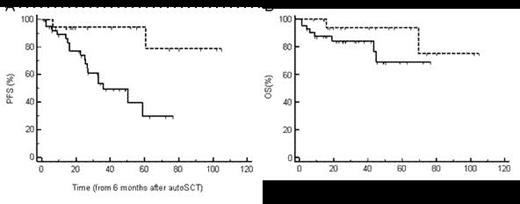Abstract
It was recently shown that rituximab maintenance therapy prolongs progression free (PFS) and overall survival (OS) in patients with mantle cell lymphoma (MCL) after conventional chemotherapy treatment. However, it is not clear if rituximab maintenance can further improve outcome of MCL patients after autologous stem cell transplantation (autoSCT).
All patients with MCL who underwent an autoSCT at the University Hospital of Heidelberg from 2000 onwards were selected for this analysis. MCL patients who have received rituximab maintenance therapy after autoSCT in a prospective phase-2 trial were compared with regard to PFS and OS with MCL patients who were transplanted during the same time period but did not receive rituximab maintenance therapy by multivariate cox regression analysis correcting for known confounders. For the comparison of rituximab maintenance therapy with the control group, rituximab maintenance therapy was considered as a time dependent event in order to avoid that early progression before start of rituximab maintenance therapy may compromise results.
A total of 72 patients met the inclusion criteria. Twenty-two patients participated in a phase-2 trial and received rituximab maintenance therapy for two years. Median age was 60 years (30-74). Prior to autoSCT all patients received rituximab and 45 patients were treated with high dose cytarabine (HD-ARA-C). AutoSCT was performed after first line treatment in 51 patients. A complete response (CR) before autoSCT was achieved by 27 patients. Patients with and without rituximab maintenance therapy did not significantly differ with regard to age, upfront autoSCT, CR rates and HD-ARA-C treatment prior to autoSCT. However, there was a trend that patients who received rituximab maintenance therapy were transplanted more recently (p=0.06).
Median observation time after autoSCT was 56 months. Two-year PFS and OS of the control group were 65% and 80%, respectively, as compared to 90% and 88%, respectively, of the rituximab maintenance group. By univariate analysis rituximab maintenance therapy was associated with significantly better PFS (HR 0.21, p=0.014; Figure 1A) but so far not OS (Figure 1B). Multivariate adjustment for age (HR per year 0.98; p=0.79), year of transplant (HR per calendar year 1.0; p=0.96), achievement of CR prior autoSCT (HR 1.59; p=0.26), upfront autoSCT (HR 0.81; p=0.80) and high dose ARA-C treatment (HR 0.69; p=0.63) confirmed the beneficial impact of rituximab maintenance therapy (p=0.02 HR 0.23).
Rituximab may prolong PFS in MCL patients who have undergone autoSCT. Prospective studies are highly warranted to confirm our preliminary finding.
Ho:Sanofi-Genzyme: Research Funding, travel grant Other.
Author notes
Asterisk with author names denotes non-ASH members.


This feature is available to Subscribers Only
Sign In or Create an Account Close Modal